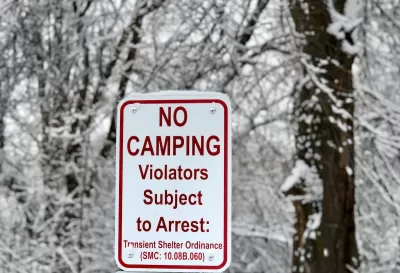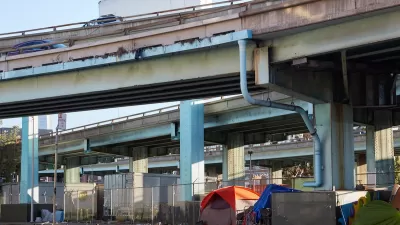The sharp increase in the unhoused population calls for urgent action, not criminalization.

In an opinion piece for The Hill, Margot Kushel and Gregg Colburn argue that the criminalization of homelessness does nothing to address its root causes, and that governments should focus on creating more affordable housing instead.
The authors point to a Supreme Court case, Grants Pass v. Johnson, which could decide whether local governments can criminalize living outdoors when shelter is not available. “This case has resulted in an inaccurate and harmful framing of homelessness by suggesting that there are only two potential outcomes: Either arrest those who are unhoused or homelessness will become an inevitable and permanent fixture of the urban landscape.”
The authors point to a third option: “providing subsidized housing with services to people experiencing homelessness.” Rather than forcibly displacing people, governments can do more to address structural causes like access to housing.
“Coordinated and well-resourced local efforts can make a measurable impact on homelessness, but without federal funding, there won’t be sustained success.” The drastic reduction in veteran homelessness since 2010 reveals the potential impact of an “appropriately scaled” federal initiative.
For the authors, “The answers to homelessness are clear. It is critical that policymakers in local, state and federal governments use their power to address the acute affordable housing shortage that plagues communities in every state in the nation.”
FULL STORY: Affordable housing is the solution to homelessness, not criminalization

Maui's Vacation Rental Debate Turns Ugly
Verbal attacks, misinformation campaigns and fistfights plague a high-stakes debate to convert thousands of vacation rentals into long-term housing.

Planetizen Federal Action Tracker
A weekly monitor of how Trump’s orders and actions are impacting planners and planning in America.

In Urban Planning, AI Prompting Could be the New Design Thinking
Creativity has long been key to great urban design. What if we see AI as our new creative partner?

Portland Raises Parking Fees to Pay for Street Maintenance
The city is struggling to bridge a massive budget gap at the Bureau of Transportation, which largely depleted its reserves during the Civd-19 pandemic.

Spokane Mayor Introduces Housing Reforms Package
Mayor Lisa Brown’s proposals include deferring or waiving some development fees to encourage more affordable housing development.

Houston Mayor Kills Another Bike Lane
The mayor rejected a proposed bike lane in the Montrose district in keeping with his pledge to maintain car lanes.
Urban Design for Planners 1: Software Tools
This six-course series explores essential urban design concepts using open source software and equips planners with the tools they need to participate fully in the urban design process.
Planning for Universal Design
Learn the tools for implementing Universal Design in planning regulations.
Gallatin County Department of Planning & Community Development
Heyer Gruel & Associates PA
JM Goldson LLC
City of Camden Redevelopment Agency
City of Astoria
Transportation Research & Education Center (TREC) at Portland State University
Jefferson Parish Government
Camden Redevelopment Agency
City of Claremont





























